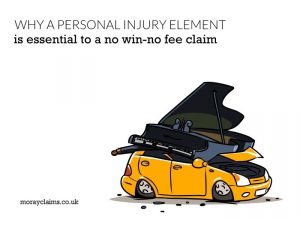(NOTE: This post contains a screencast video, below, with a walk-through of how best to use the Law Society of Scotland's "Find a Solicitor" Online Tool to locate a specialist personal injury solicitor who is local to you). You don’t have to use the solicitors your insurers may tell you to use for your personal injury claim. We recommend you to get help from a solicitor who meets two main criteria: They should be local, and they should be specialised. 1. Local solicitor We recommend you to engage the services of a local solicitor, if possible. What do we mean by local? Ideally, a solicitor who is local to you and local to the location of the accident. Even getting a solicitor who is local in only one of these two ways is probably better than a solicitor who is neither close to you nor the place where the accident happened. 2. Specialist solicitor These days, all solicitors are specialists to some extent. Personal injury law is a complex area and you need Continue Reading
Why a personal injury element is essential to a no win-no fee claim
Or, to put it another way, why don’t pure property damage claims work no win no fee? Dealing with motor insurers can be a frustrating process. This article was prompted by a question via the Grigor & Young website. The person making the enquiry said of their dealings with the third party insurers: It is an ‘online’ process and one is left for long periods of time on the telephone (twice my phone has run out of power from being fully charged) while trying to get a response. The enquirer had been involved in a road traffic accident that was not their fault. Their car was damaged and needed repairs. The car belonged to one of their parents. They were insured to drive the parent’s car through their comprehensive insurance on their own car. Ordinarily, in a “comprehensive” scenario, you may well choose to claim under your own policy (even if the accident was not your fault) because you have a contract with your insurers. You have more control. You have more clout if Continue Reading
9 Questions to ask your Legal Expenses Insurer if you want your own solicitor to handle your personal injury claim
In other articles, we have discussed how legal expenses insurance can help minimise the cost risk to you if you need to make a personal injury claim for compensation. The term “legal expenses insurance” can include both before-the-event (BTE) insurance and after-the-event (ATE) insurance. With ATE insurance, the insurance policy is taken out after the accident in order to cover the risk of having to pay the opponent’s legal costs (for example, if you raise a court action but the claim fails and you lose). BTE insurance covers against future legal costs but was in place before the event which gave rise to the claim, such as the accident which has caused the personal injury for which you need to claim compensation. BTE insurance generally limits your freedom to choose your own legal representative because claimants are directed to use firms of solicitors which are on the BTE insurer’s approved panel. Panel firms may be located a considerable distance from your home, especially Continue Reading
Why you should always make use of insurance, if you have it
We criticise insurance companies on this blog quite often. Of course, insurance companies are frequently critical of solicitors who help people to make personal injury claims. They are also critical of claimants themselves. As well as people with possible personal injury compensation claims, we get a lot of enquiries from people who are worried that some sort of compensation claim might be made against them. If they have insurance cover, they are not sure if they should use it. If you have insurance that will help you defend a claim against you for personal injury (or property damage), you should make use of it. Here are a couple of very recent examples. The first scenario is a road traffic accident. Of course, in theory, it is compulsory to have motor insurance to cover you against the risk of liability to a 3rd party. In this case, the person making the enquiry to us had been driving at night in a suburban area. There was street lighting. The car in front was Continue Reading



